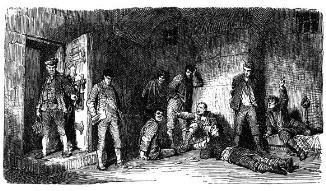
|
William Michals as Chauvelin SP4: National Tour Printable Version |


Imagine: You are ripped from your bed in the middle of the night or taken in broad day light on a street corner. You've been denounced by a neighbor for a casual word or letter against the government. After a trial, you are declared an enemy of the state. You are taken by a two wheeled cart (called a "tumbrel") to the guillotine.

The "sans-cullotes" call for more action against the enemies
of the state. The Convention decides to create the apparatus of the
Terror. The Terror's main purpose was to channel the people's rage; as
Danton says, "Let us embody terror so as to prevent the people from
doing so." Under the terror, words, as well as actions, can lead to
denunciation. Neighbors denounce neighbors, friends inform on friends. A
"counter-revolutionary" remark can lead to an interrogation and
land you in prison or under the guillotine's blade.
Between September 1793 and July 1794 over 2500 people die under the guillotine in Paris. Over ten thousand are killed in the French provinces. This is the beginning of the Reign of Terror.
Death and violence...was not a by-product of the Revolution,
but the very essence of it. Organized killing was seen as necessary
to wipe out the Revolution's enemies and make the republic secure.
The shedding of blood, in Revolutionary art and literature, took on an
almost religious aura, a sacrificial purging of the state to allow it to
grow and flourish.
- Steven Otfinoski, Triumph and Terror: The French Revolution (Facts
on File, NY, 1993)
The gruesome picture of the mob in The Scarlet Pimpernel is no exaggeration: the crowd at the guillotine came to resemble the throng at a sporting event, jeering those who cry, cheering those who show bravery. Groups of women even knit between the executions (Charles Dickens writes about these women in his classic novel, A Tale of Two Cities).
In November, 1793, Danton begins to cry out for an end to the Terror - France's enemies had been beaten back and her internal foes had been beaten, too. This puts him in direct contradiction with Robespierre and the other leaders of the Revolution.
Danton is arrested on March 31, 1794 and charged with treason. Although his speeches and cries for justice are, as always, eloquent and passionate, he is sentenced to death.
Now Robespierre and his allies increase their influence. The definition of "public enemy" is widened, and the rights of the accused are diminished in what becomes known as The Great Terror.
During a 49-day period in June and July, over 1400 people are executed in Paris - 200 a week!
Robespierre becomes more sure of himself and his power. However, on July 27, he arrives at the Convention, and before he can open his mouth, he himself is denounced. He is called a tyrant, an enemy of the people. Caught off guard, he is too surprised to speak - in the world of the Terror, eloquence is the sharpest weapon and he finds himself defenseless. His arrest is called for; he is taken from the assembly hall by an armed guard, and executed the next day. Although a rescue is attempted while he is in captivity, historians still debate why a popular uprising was not arranged in his support.
With Robespierre's death, and the purge of the Jacobins from the National Convention, the power of the Committee of Public Safety is diminished. The radical period of the French Revolution is over. The new government, called the Thermidorian government, eliminates Jacobin price controls and the resulting high prices of food lead to a popular revolt in the spring of 1795, the last uprising of the Revolution.
- The Baroness Orczy, Links in the Chain of Life
Website Copyright Policy